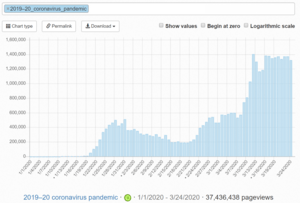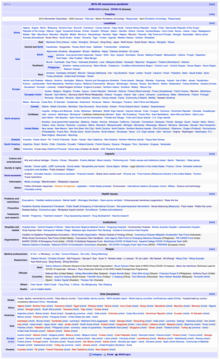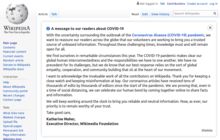Wikipedia's response to the COVID-19 pandemic
Wikipedia experienced an increase in readership during the COVID-19 pandemic.[1] Editors have worked to remove misinformation.[2][3] According to the newspaper Dawn, since reports of cases in Wuhan emerged in December 2019, Wikipedia editors have averaged 163 edits per hour. Across all Wikipedia languages, there are approximately 4,500 Wikipedia pages related to the pandemic, as of 23 April 2020.[4]

Wikipedia

In mid-March, Noam Cohen of Wired said editors' work on articles related to the pandemic demonstrated "that Wikipedia has also developed a conscience".[5] Cohen described how Wikipedia's efforts to combat misinformation related to the pandemic differed from some other major website and opined, "Unless Twitter, Facebook and the others can learn to address misinformation more effectively, Wikipedia will remain the last best place on the Internet."[5]
The numbers of Wikipedia viewers globally rose to record levels because of the pandemic. In his article "Why Wikipedia Is Immune to Coronavirus", Omer Benjakob of Haaretz wrote, "Wikipedia has stepped in to provide relief. So much so that it has become the go-to source for COVID-19 information."[6]
English Wikipedia

The "Coronavirus" page was created in 2013. The "2019–2020 China pneumonia outbreak" Wikipedia article, which evolved into the English Wikipedia's main article about the pandemic, was created on 5 January 2020. Wikipedia entries were subsequently created for "Severe acute respiratory syndrome coronavirus 2" and "Coronavirus disease 2019".[2] By 9 February, the main article had been edited more than 6,500 times by approximately 1,200 editors, and six of the primary Wikipedia articles about the pandemic were viewed more than 18 million times. Other early entries included an overview of the pandemic by country and territory, a timeline, and another focused on xenophobia and racism. The Wikipedia pages about bats as food, the Corona beer brand, severe acute respiratory syndrome (SARS), and Wuhan also saw increased editing.[2] To deal with the unique global situation, a special section for key informational links related to the COVID-19 pandemic was added to the "In the News" section of the English Wikipedia's main page to help quickly directly viewers to essential information.[6]
As the pandemic spread, editors worked to keep up with the barrage of new information and misinformation being added to the site. Information on Wikipedia was used to create data visualisations and shared on Reddit, Twitter, and other social media platforms.[2] More than 2,100 editors had contributed to the main article about the pandemic by 19 March.[7]

Editors formed WikiProject COVID-19, a WikiProject dedicated to the disease and pandemic. Volunteers have worked to translate short entries into Wikipedias of other languages. The WikiProject had 90 members by 24 March.[8] Members of WikiProject Medicine, including James Heilman,[5] have also worked to improve coverage of COVID-19.[2] Heilman was featured on CBS Morning News in May.[9]
Wikipedia editors deleted and later restored an entry called "2020 Tablighi Jamaat coronavirus hotspot in Delhi", which project founder Jimmy Wales said "was incredibly poorly written and had zero sources".[10][11] Wales responded to accusations on Twitter stating that Wikipedia did not accept payment for the article's deletion.[12][13]
Readership spikes have reflected significant developments in the disease's spread. "COVID-19 pandemic in Pakistan" saw a traffic spike in late March, with daily page views ranging from 80,000 to 100,000; the article ranked number 72 for the month's most read pages. In early April, Wikimedia projects received 673 million page views in a 24-hour period, the highest in five years.[4] English Wikipedia had 283 coronavirus articles by then, with the main entry receiving more than 17,000 edits and 20 million views.[3] Entries about the pandemic received 240 million views by 23 April 2020, with the page about misinformation related to the pandemic receiving an average of 14,000 views per day.[4]
Google search displayed incorrect data about deaths toll from COVID-19, which came from English Wikipedia.[14]
German Wikipedia
There are hundreds of Wikipedia articles about the coronavirus pandemic at German Wikipedia. Editors began writing about the pandemic in January 2020, when the outbreak was advancing in China. The main article about the pandemic and the entry for the disease's spread in Germany were being accessed approximately 150,000 and 100,000 times per day, respectively, as of March 2020.[8]
Indian languages

Wikipedia had COVID-19 information in nine Indian languages by 27 March 2020: Arabic, Bangla, Bhojpuri, Hindi, Kannada, Malayalam, Tamil, Telugu, and Urdu. SWASTHA (acronym for Special Wikipedia Awareness Scheme for the Healthcare Affiliates),[15] a division of WikiProject Medicine, is working with Johns Hopkins University, India's Ministry of Health and Family Welfare and National Health Authority, and the World Health Organization to improve coverage.[16][17]
Urdu Wikipedia's entry for coronavirus was viewed more than 12,000 times by 23 April 2020.[4]
Japanese Wikipedia
There are over one hundred Wikipedia articles about the coronavirus pandemic at the Japanese Wikipedia. The Wikipedia article "Abenomask (アベノマスク)" drew attention due to its deletion request. The word refers to a government plan involving reusable clothmasks. Some said that the name was an insult against Shinzo Abe, others that it was not an insult and showed usage in Sankei Shimbun, a Japanese conservative and right-wing newspaper.[18] The community decided that it should not be deleted.[19][20][21]
Spanish Wikipedia
The main article about the pandemic at Spanish Wikipedia was created by an editor from Costa Rica on 19 January 2020. By mid April, the article had been edited more than 5,000 times, included 350 references, and received more than 5 million views. The entry was being monitored by approximately 175 editors at the time, receiving an average of 80,000 views per day.[22]
Wikidata
According to Wired, BridgeDb is creating coronavirus gene and protein mapping databases from information supplied by Wikidata, a sibling project of Wikipedia, as part of a collaboration with Wikidata's WikiProject COVID-19.[23]
Wikimedia Foundation
The Wikimedia Foundation, the nonprofit organization that supports Wikimedia movement projects, including Wikipedia, had employees work remotely. The foundation's executive director, Katherine Maher, has encouraged editors and readers to work together to improve Wikipedia's coverage of COVID-19.[8]
References
- Koeze, Ella; Popper, Nathaniel (2020-04-07). "The Virus Changed the Way We Internet". The New York Times. ISSN 0362-4331. Retrieved 2020-04-22.
- Benjakob, Omer (2020-02-09). "On Wikipedia, a fight is raging over coronavirus disinformation". Wired UK. ISSN 1357-0978. Retrieved 2020-04-22.
- Dodds, Laurence (2020-04-03). "Why Wikipedia is winning against the coronavirus 'infodemic'". The Daily Telegraph. ISSN 0307-1235. Retrieved 2020-04-22.
- Jahangir, Ramsha (23 April 2020). "Wikipedia breaks five-year record with high traffic in pandemic". Dawn. Retrieved 23 April 2020.
- Cohen, Noam (15 March 2020). "How Wikipedia Prevents the Spread of Coronavirus Misinformation". Wired. Retrieved 24 April 2020.
- Benjakob, Omer (2020-04-08). "Why Wikipedia Is Immune to Coronavirus". Haaretz. Retrieved 2020-04-22.
- Harrison, Stephen (2020-03-19). "The Coronavirus Is Stress-Testing Wikipedia's Systems—and Editors". Slate. Retrieved 2020-04-22.
- "Hochzeiten für Wikipedia: Dauerhafte Coronavirus-Updates" [Golden era for Wikipedia: substantial coronavirus updates]. Heise Online (in German). Heinz Heise. 24 March 2020. Retrieved 22 April 2020.
- May 24, CBS News. "The rise of Wikipedia as a source of medical information". www.cbsnews.com. Retrieved 26 May 2020.
- Chitra, Rachel. "On Wikipedia, Quora & Twitter, battle rages against communalisation of Covid-19, Jamaat event". The Times of India. Retrieved 2020-04-22.
- Jena, Smrutisnat (19 April 2020). "Wikipedia Founder Responds To Angry Indians Who Ask Him If He Knows How Wikipedia Works". ScoopWhoop. Retrieved 22 April 2020.
- Gaur, Viraj (18 April 2020). "Twitter Users Accuse Wikipedia of Taking Bribes, Founder Responds". The Quint. Retrieved 22 April 2020.
- "Wikipedia's befitting reply to 'bribe to delete Tablighi' page". The Siasat Daily. 19 April 2020. Retrieved 22 April 2020.
- "グーグル検索で新型コロナ死者数が過大に表示 ゼロのはずが「4人」、13人が「30人」のケースも |まいどなニュース". まいどなニュース (in Japanese). Retrieved 2020-05-15.
- "Wikipedia Has a Special Project to Fight Coronavirus Fake News in India". NDTV. Retrieved 2020-04-22.
- "Wikipedia's SWASTHA project to help fight Covid-19 fake news in India: Report". Hindustan Times. 2020-04-03. Retrieved 2020-04-22.
- "Wikipedia has COVID-19 information in Bangla, Hindi, Tamil and 6 other Indian languages". Hindustan Times. 2020-03-27. Retrieved 2020-04-22.
- "【襲来!コロナウイルス】「アベノマスク」って差別語だったの? 「ウィキペディア」の項目の削除要求をめぐるトンデモ大論争". J-CAST 会社ウォッチ (in Japanese). 2020-04-24. Retrieved 2020-05-15.
- "Wikipedia:削除依頼/アベノマスク", Wikipedia (in Japanese), 2020-04-26, retrieved 2020-05-15
- "From Abenomics to Abenomask: Japan Mask Plan Meets With Derision". www.bloomberg.com (2 April 2020). Retrieved 15 May 2020.
- 柳井政和 (2020-06-04). "静かに繰り広げられる、「アベノマスク」 Wikipediaの攻防". ハーバー・ビジネス・オンライン (in Japanese). Retrieved 2020-06-16.
- Veiga, Yolanda (15 April 2020). "El coronavirus pone a prueba Wikipedia". Hoy (in Spanish). Retrieved 24 April 2020.
- Sterling, Bruce (21 April 2020). "A Covid19 data portal". Wired. Retrieved 22 April 2020.
Further reading
- "Wikipedia on COVID-19: what we publish and why it matters". The Signpost. English Wikipedia. 29 March 2020.
- "Open data and COVID-19: Wikipedia as an informational resource during the pandemic". The Signpost. English Wikipedia. 26 April 2020.
External links
- Maher, Katherine (15 March 2020). "People First: Wikimedia's Response to COVID-19". Medium.
- Thalen, Mikael (March 25, 2020). "Meet the Wikipedia editors fighting to keep coronavirus pages accurate". The Daily Dot.
- "Meet some of the women sharing reliable COVID-19 information with the world on Wikipedia". Medium. Wikimedia Foundation. 3 April 2020.
- Sáez-Trumper, Diego (16 April 2020). "Open data and COVID-19: Wikipedia as an informational resource during the pandemic". Medium.